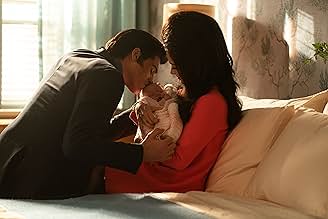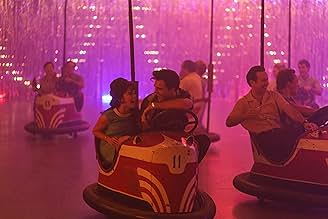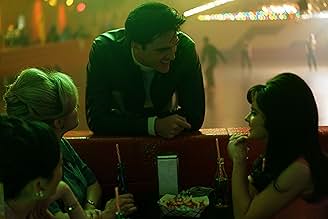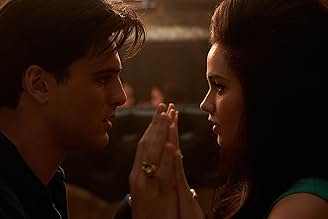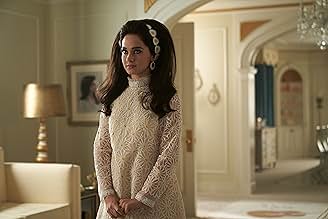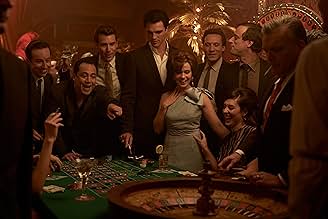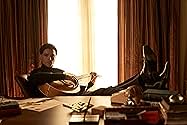L'adolescente Priscilla Beaulieu incontra Elvis Presley, ma l'uomo che è già una fulminea superstar del rock and roll, diventa qualcuno del tutto inaspettato nei momenti privati. Migliori am... Leggi tuttoL'adolescente Priscilla Beaulieu incontra Elvis Presley, ma l'uomo che è già una fulminea superstar del rock and roll, diventa qualcuno del tutto inaspettato nei momenti privati. Migliori amici, vulnerabili e alleati nella solitudine.L'adolescente Priscilla Beaulieu incontra Elvis Presley, ma l'uomo che è già una fulminea superstar del rock and roll, diventa qualcuno del tutto inaspettato nei momenti privati. Migliori amici, vulnerabili e alleati nella solitudine.
- Regia
- Sceneggiatura
- Star
- Premi
- 6 vittorie e 35 candidature totali
Dan Beirne
- Joe
- (as Daniel Beirne)
Recensioni in evidenza
Priscilla does really well when it comes to cinematography and direction. There are good shots in the movie and Coppola did an amazing job as director.
However, the screenplay was very disappointing to me. The story feels slow at times and gets into a repetitive cycle after a while: Elvis does something horrible to Priscilla, they fight, Priscilla hesitates to leave him, and finally forgives him for unexplainable reasons. And in the end, when she finally leaves him, we don't know what finally made her make the decision, she just leaves. Moreover, I was expecting to see more of Priscilla's life where Elvis is not a central part of the story, as the title might have suggested, but the film starts when she meets him and ends when he is no longer part of her life.
Apart from that, I think Cailee Spaeny did an incredible job and is the highlight of the movie. I have mixed feelings about Jacob Elordi, at times he felt like the perfect choice for the role, but other times it felt like I was watching his Euphoria character.
The movie is a beautifully decorated but empty box.
However, the screenplay was very disappointing to me. The story feels slow at times and gets into a repetitive cycle after a while: Elvis does something horrible to Priscilla, they fight, Priscilla hesitates to leave him, and finally forgives him for unexplainable reasons. And in the end, when she finally leaves him, we don't know what finally made her make the decision, she just leaves. Moreover, I was expecting to see more of Priscilla's life where Elvis is not a central part of the story, as the title might have suggested, but the film starts when she meets him and ends when he is no longer part of her life.
Apart from that, I think Cailee Spaeny did an incredible job and is the highlight of the movie. I have mixed feelings about Jacob Elordi, at times he felt like the perfect choice for the role, but other times it felt like I was watching his Euphoria character.
The movie is a beautifully decorated but empty box.
Early in Sofia Coppola's languid distillation of Priscilla Presley's life with Elvis, she receives a beautifully coiffed and presented gift of a pet poodle. Priscilla (Cailee Spaeny) had recently moved into Graceland when she gets the present. 14 when they met in Germany, Priscilla was still only 17. She coddles the pooch and treats it like a little princess. Coppola (who wrote the screenplay adapted from Priscilla's book) makes a case that Elvis (Jacob Elordi) viewed his then future wife as a type of possession. When the teenager asks for permission to take a part-time job, the musician forbades it saying that he needs her to be available whenever he desires. Like the dog, Priscilla is always to be primped and pampered to its owner's specifications.
One could say that PRISCILLA represents the other side of Baz Luhrman's recent phantasmagorical film ELVIS in both style and POV. That's certainly true in many ways, but it's doubtful that Coppola would have made her movie much differently even if Luhrman's film didn't exist. Phillipe La Sourd's cinematography, Tamara Deverell's Production Design and Stacey Battat's costuming all fit nicely within Coppola's aesthetic. The filmmaker's love of pop music is also fully on display with period songs mixed freely with more recent tunes in a similar vein (the movie begins with The Ramones and fades out with Dolly Parton).
Coppola has rarely been an auteur interested in pure plot and narrative drive. She prefers to soak the viewer into the milieu of her characters. On that level, PRISCILLA has a certain effectiveness. Neither Spaeny nor Elordi are stars, but, their anonymity adds to their relatability. Elordi in particular, faces not only comparisons to Austin Butler's ebullient Oscar nominated performance, but decades of imitators. He humanizes the mythic figure even if, at a certain point, his lack of flash reduces the King of Rock 'N Roll to too much the mere mortal. The elephant in the room is, of course, that Elvis would be considered persona non grata in today's climate. When Priscilla first enters Graceland, Elvis' ever-present entourage are taken aback at how young she looks. Coppola exaggerates the difference by casting actors over a foot apart in height (the real difference was closer to 8"). It does make her look like a little girl (and Spaeny convincingly pulls it off despite being only a year younger than Elordi; Elvis was a decade Priscilla's senior). In Coppola (and Priscilla's) telling, Elvis isn't portrayed as making his young wife into a purely sexual object. He kept her under glass in his misguided notion that he was protecting her. To make her into an idealized good Christian girl and modern Southern belle who his recently deceased mama could have been proud of. It's an extraordinary tricky balance - particularly with the real Priscilla being a Producer on this film.
By design, PRISCILLA never takes a truly deep look at all the details of the couple's lives. Colonel Tom Parker is only vaguely alluded to. The viewer sees Elvis performing only near the very end, and briefly. Once at Graceland, Priscilla is barely shown with anyone other than Elvis' posse. The movie only spans the years they were together. It's a very insular movie which relies heavily on mood and atmosphere. It will be up to each individual viewer if that is sufficient.
One could say that PRISCILLA represents the other side of Baz Luhrman's recent phantasmagorical film ELVIS in both style and POV. That's certainly true in many ways, but it's doubtful that Coppola would have made her movie much differently even if Luhrman's film didn't exist. Phillipe La Sourd's cinematography, Tamara Deverell's Production Design and Stacey Battat's costuming all fit nicely within Coppola's aesthetic. The filmmaker's love of pop music is also fully on display with period songs mixed freely with more recent tunes in a similar vein (the movie begins with The Ramones and fades out with Dolly Parton).
Coppola has rarely been an auteur interested in pure plot and narrative drive. She prefers to soak the viewer into the milieu of her characters. On that level, PRISCILLA has a certain effectiveness. Neither Spaeny nor Elordi are stars, but, their anonymity adds to their relatability. Elordi in particular, faces not only comparisons to Austin Butler's ebullient Oscar nominated performance, but decades of imitators. He humanizes the mythic figure even if, at a certain point, his lack of flash reduces the King of Rock 'N Roll to too much the mere mortal. The elephant in the room is, of course, that Elvis would be considered persona non grata in today's climate. When Priscilla first enters Graceland, Elvis' ever-present entourage are taken aback at how young she looks. Coppola exaggerates the difference by casting actors over a foot apart in height (the real difference was closer to 8"). It does make her look like a little girl (and Spaeny convincingly pulls it off despite being only a year younger than Elordi; Elvis was a decade Priscilla's senior). In Coppola (and Priscilla's) telling, Elvis isn't portrayed as making his young wife into a purely sexual object. He kept her under glass in his misguided notion that he was protecting her. To make her into an idealized good Christian girl and modern Southern belle who his recently deceased mama could have been proud of. It's an extraordinary tricky balance - particularly with the real Priscilla being a Producer on this film.
By design, PRISCILLA never takes a truly deep look at all the details of the couple's lives. Colonel Tom Parker is only vaguely alluded to. The viewer sees Elvis performing only near the very end, and briefly. Once at Graceland, Priscilla is barely shown with anyone other than Elvis' posse. The movie only spans the years they were together. It's a very insular movie which relies heavily on mood and atmosphere. It will be up to each individual viewer if that is sufficient.
Before Elvis Presley's daughter Lisa Marie passed away earlier this year, she was quite contemptuous over Sofia Coppola's portrayal of her parents in her biographical feature Priscilla. Based on Priscilla Presley's 1985 memoir Elvis and Me, the film has nonetheless garnered mostly positive reviews and even earned Cailee Spaeny the Volpi Cup for Best Actress at the 2023 Venice Film Festival. Given that Priscilla herself was an executive producer on this project, it's best to look at this project at a more earnest portrayal of Elvis and Priscilla instead of it being romanticized or sugar coated.
Now as this film depicts the courtship between a then 14 year old Priscilla and a then 24 year old Elvis, the biggest takeaway from this feature is that it's supposed to comment more on the idea of love being difficult to obtain as the wife of a global superstar. While it does depict a taboo romantic subject in mind, it becomes far more toxic when Elvis proves to be far more manipulative and abusive than his rockstar persona claims otherwise. Cailee Spaeny and Jacob Elordi share quite a conflicting bond as their depictions show a more disturbing underbelly to what the public thought of the Presleys otherwise. Coppola makes sure to emphasize the unfortunate implications behind their relationship without directly endorsing it, especially as we can see how much the spousal torment and jadedness behind the life of fame creates more misery in Priscilla than to the people worried for her like her parents and socialites. Behind all the rock & roll, glamour and pizazz lies a hollow marriage where one is no longer illusioned to much of anything, be it romance or appreciation for the music.
That being said, outside of the disturbing implications behind Priscilla and Elvis' courtship, there really isn't much else to take away from the movie. By putting so much of Priscilla's perspective into the limelight, the portrayal of her husband isn't interesting enough to dissect beyond him being a fake charming guy who more so likes the idea of a soul mate instead of actually being with one consistently. It doesn't help that the film rushes certain plot points just to get to Presley's life of prestige, such as Priscilla's time with her rightfully concerned family, her trouble focusing in school and even the implied drug addictions she and her husband faced. Despite that latter key point playing a big role in Elvis' abusive behavior, it isn't explored enough to leave much of a dramatic impact. In fact, for a film that tries to incorporate themes of domestic abuse, it feels surprisingly lacking in showing much of that tension. Also, once the film ends, it feels as if it missed the opportunity to go more into Priscilla's life after leaving Elvis for good, almost as if it felt it didn't need to tell more when it should have.
Outside of those qualities, the filmmaking is competent enough yet never rises above decently well crafted in depicting the era of subject. The cultural aesthetic of the late 50s and early to mid 60s feels more tact on for the sake of the time period, as outside of some of the road shows and projects Elvis is apart of, only the costuming sticks out the most, and yet the film hardly does much with them to make much of an impression. If anything, the pop cultural influence from this era feels more like an accompaniment to the story than really playing much of a role beyond the media playing up Elvis' life as more than it really is. Also, the lack of much of a background score surprisingly doesn't work as most of the scenes play out with an awkward tension that would have benefited from more than just what's on the soundtrack. Speaking of which, for some reason there are all kinds of retro and contemporary rock and jazz songs except from the king himself. Perhaps given the involvement of Priscilla Presley and her ex-husband's enterprises, this comes off as understandable yet confusing.
So while made with earnest intentions and captivating performances, Priscilla is a decent enough biopic that falls flat in exploring more about its subject matter beyond superficial love and all the glitz and glamour that comes with it. I would recommend this on the grounds that it's more interesting than it is thought provoking, though definitely take that for what it's worth given how much influence was done by the target at hand. Besides, even if the king is no longer looked at the same way he was then, projects like these are good reminders to not look up to everyone you admire, let alone fall for.
Now as this film depicts the courtship between a then 14 year old Priscilla and a then 24 year old Elvis, the biggest takeaway from this feature is that it's supposed to comment more on the idea of love being difficult to obtain as the wife of a global superstar. While it does depict a taboo romantic subject in mind, it becomes far more toxic when Elvis proves to be far more manipulative and abusive than his rockstar persona claims otherwise. Cailee Spaeny and Jacob Elordi share quite a conflicting bond as their depictions show a more disturbing underbelly to what the public thought of the Presleys otherwise. Coppola makes sure to emphasize the unfortunate implications behind their relationship without directly endorsing it, especially as we can see how much the spousal torment and jadedness behind the life of fame creates more misery in Priscilla than to the people worried for her like her parents and socialites. Behind all the rock & roll, glamour and pizazz lies a hollow marriage where one is no longer illusioned to much of anything, be it romance or appreciation for the music.
That being said, outside of the disturbing implications behind Priscilla and Elvis' courtship, there really isn't much else to take away from the movie. By putting so much of Priscilla's perspective into the limelight, the portrayal of her husband isn't interesting enough to dissect beyond him being a fake charming guy who more so likes the idea of a soul mate instead of actually being with one consistently. It doesn't help that the film rushes certain plot points just to get to Presley's life of prestige, such as Priscilla's time with her rightfully concerned family, her trouble focusing in school and even the implied drug addictions she and her husband faced. Despite that latter key point playing a big role in Elvis' abusive behavior, it isn't explored enough to leave much of a dramatic impact. In fact, for a film that tries to incorporate themes of domestic abuse, it feels surprisingly lacking in showing much of that tension. Also, once the film ends, it feels as if it missed the opportunity to go more into Priscilla's life after leaving Elvis for good, almost as if it felt it didn't need to tell more when it should have.
Outside of those qualities, the filmmaking is competent enough yet never rises above decently well crafted in depicting the era of subject. The cultural aesthetic of the late 50s and early to mid 60s feels more tact on for the sake of the time period, as outside of some of the road shows and projects Elvis is apart of, only the costuming sticks out the most, and yet the film hardly does much with them to make much of an impression. If anything, the pop cultural influence from this era feels more like an accompaniment to the story than really playing much of a role beyond the media playing up Elvis' life as more than it really is. Also, the lack of much of a background score surprisingly doesn't work as most of the scenes play out with an awkward tension that would have benefited from more than just what's on the soundtrack. Speaking of which, for some reason there are all kinds of retro and contemporary rock and jazz songs except from the king himself. Perhaps given the involvement of Priscilla Presley and her ex-husband's enterprises, this comes off as understandable yet confusing.
So while made with earnest intentions and captivating performances, Priscilla is a decent enough biopic that falls flat in exploring more about its subject matter beyond superficial love and all the glitz and glamour that comes with it. I would recommend this on the grounds that it's more interesting than it is thought provoking, though definitely take that for what it's worth given how much influence was done by the target at hand. Besides, even if the king is no longer looked at the same way he was then, projects like these are good reminders to not look up to everyone you admire, let alone fall for.
Just rather uninteresting, on film terms at least.
It is interesting seeing the film portray a different type of version of Elvis Presley, one that is uncomfortable to watch unfold but one that ought to be told. That's where anything noteworthy I have to say about this release ends, though. As a movie, it's rather boring. I'm not convinced there's enough to be told across a full blown picture, at least not one around 1hr 45mins in length. I will say that Cailee Spaeny puts in a solid display as the titular character, in fairness.
Jacob Elordi as Elvis, in my opinion, isn't a positive to be honest. If I didn't know he was playing Elvis I genuinely wouldn't have guessed he was playing the singer, aside from a few outfits and the twisty bit of hair in his fringe. Accent particularly seemed off to me too, Elordi amusingly (given the director's connection) sounds more like Nicolas Cage (c. 1997, 'Con Air', Cameron Poe) on phone call scenes.
It's competently put together visually at least, though overall I can't honestly say this made a mark on me personally. I don't feel like I learnt anything about 'Priscilla' herself. I doubt I'll remember this one long term, sadly.
It is interesting seeing the film portray a different type of version of Elvis Presley, one that is uncomfortable to watch unfold but one that ought to be told. That's where anything noteworthy I have to say about this release ends, though. As a movie, it's rather boring. I'm not convinced there's enough to be told across a full blown picture, at least not one around 1hr 45mins in length. I will say that Cailee Spaeny puts in a solid display as the titular character, in fairness.
Jacob Elordi as Elvis, in my opinion, isn't a positive to be honest. If I didn't know he was playing Elvis I genuinely wouldn't have guessed he was playing the singer, aside from a few outfits and the twisty bit of hair in his fringe. Accent particularly seemed off to me too, Elordi amusingly (given the director's connection) sounds more like Nicolas Cage (c. 1997, 'Con Air', Cameron Poe) on phone call scenes.
It's competently put together visually at least, though overall I can't honestly say this made a mark on me personally. I don't feel like I learnt anything about 'Priscilla' herself. I doubt I'll remember this one long term, sadly.
Wow, this was an uncomfortable movie to watch. Priscilla invites inevitable comparisons to last year's "Elvis," portraying an exact opposite narrative. Helmed by the talented Sophia Coppola, who commands great respect, and featuring Jacob Elordi, an actor I admire, the film falls short of expectations. Unfortunately, it presents a one-dimensional, flat perspective that left me somewhat disappointed.
While the performances are strong, and the direction commendable, Priscilla's narrative feels tedious and slow at times. The harrowing depiction of power imbalances in the central relationship adds a layer of discomfort that makes the film hard to watch. Sophia Coppola's artistic choices unveil a side of the characters that, while impactful, renders the viewing experience challenging. Priscilla sheds light on the vulnerability of a young protagonist, emphasizing the discomfort of witnessing a story where she is just a child.
While the performances are strong, and the direction commendable, Priscilla's narrative feels tedious and slow at times. The harrowing depiction of power imbalances in the central relationship adds a layer of discomfort that makes the film hard to watch. Sophia Coppola's artistic choices unveil a side of the characters that, while impactful, renders the viewing experience challenging. Priscilla sheds light on the vulnerability of a young protagonist, emphasizing the discomfort of witnessing a story where she is just a child.
Lo sapevi?
- QuizElvis Presley Enterprises declined both their approval for Sofia Coppola's film and their permission to use Elvis Presley's songs in the film. Coppola then took to creative alternatives, including contemporary music by her husband's band, Phoenix, and cover versions of songs from the film's era.
- BlooperThe title superimposed over the opening scene is "US Air Force Base West Germany 1959" over an image of a 50 star flag. This should have been a 48 or 49 star flag. Although Hawaii had been admitted to the union on August 21, 1959, the new flag was not officially raised until July 4, 1960.
- Curiosità sui creditiA photo of the crew is shown after the end credits.
- ConnessioniFeatured in The Making of Priscilla (2023)
- Colonne sonoreGoing Home
Written by Alice Coltrane and Carlos Santana
Performed by Alice Coltrane
Courtesy of Verve Records under license from Universal Music Enterprises
I più visti
Accedi per valutare e creare un elenco di titoli salvati per ottenere consigli personalizzati
Seen On Screen: Elvis and Priscilla Presley
Seen On Screen: Elvis and Priscilla Presley
IMDb looks back at when both Elvis and Priscilla Presley have been portrayed by actors on screen, plus a few times the King and his wife played their own parts.
- How long is Priscilla?Powered by Alexa
Dettagli
Botteghino
- Budget
- 20.000.000 USD (previsto)
- Lordo Stati Uniti e Canada
- 20.960.939 USD
- Fine settimana di apertura Stati Uniti e Canada
- 132.139 USD
- 29 ott 2023
- Lordo in tutto il mondo
- 33.112.676 USD
- Tempo di esecuzione1 ora 53 minuti
- Colore
- Mix di suoni
- Proporzioni
- 1.85 : 1
Contribuisci a questa pagina
Suggerisci una modifica o aggiungi i contenuti mancanti








